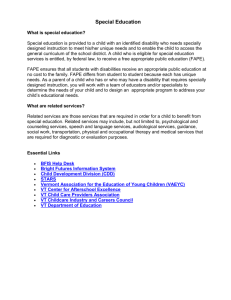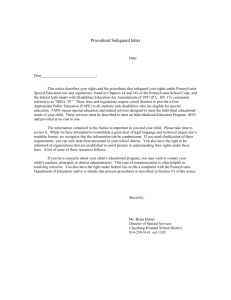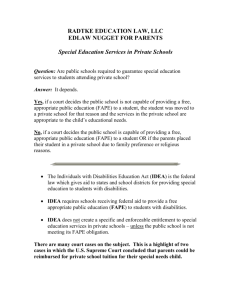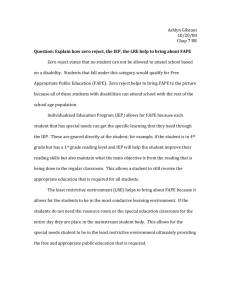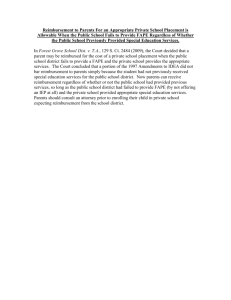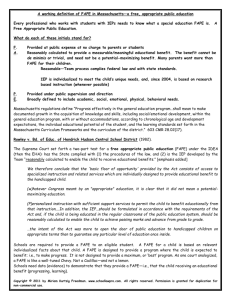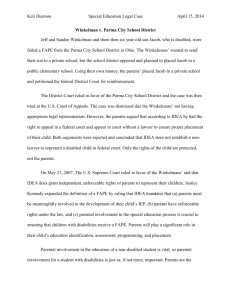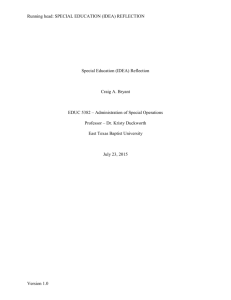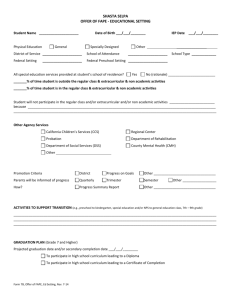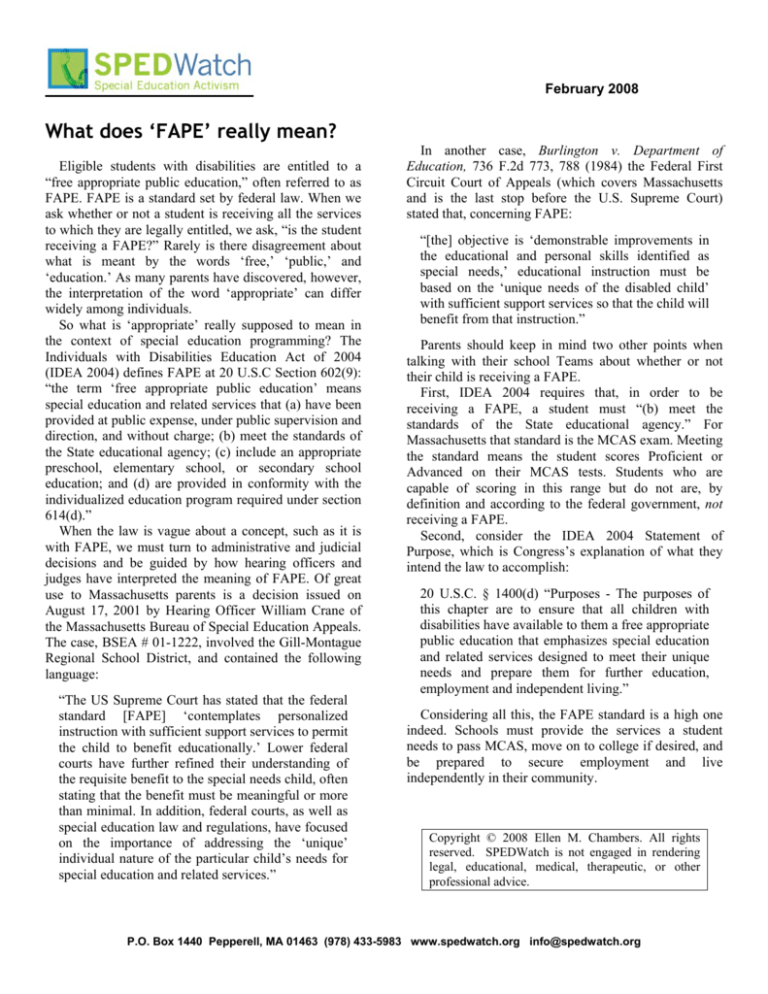
February 2008
What does ‘FAPE’ really mean?
Eligible students with disabilities are entitled to a
“free appropriate public education,” often referred to as
FAPE. FAPE is a standard set by federal law. When we
ask whether or not a student is receiving all the services
to which they are legally entitled, we ask, “is the student
receiving a FAPE?” Rarely is there disagreement about
what is meant by the words ‘free,’ ‘public,’ and
‘education.’ As many parents have discovered, however,
the interpretation of the word ‘appropriate’ can differ
widely among individuals.
So what is ‘appropriate’ really supposed to mean in
the context of special education programming? The
Individuals with Disabilities Education Act of 2004
(IDEA 2004) defines FAPE at 20 U.S.C Section 602(9):
“the term ‘free appropriate public education’ means
special education and related services that (a) have been
provided at public expense, under public supervision and
direction, and without charge; (b) meet the standards of
the State educational agency; (c) include an appropriate
preschool, elementary school, or secondary school
education; and (d) are provided in conformity with the
individualized education program required under section
614(d).”
When the law is vague about a concept, such as it is
with FAPE, we must turn to administrative and judicial
decisions and be guided by how hearing officers and
judges have interpreted the meaning of FAPE. Of great
use to Massachusetts parents is a decision issued on
August 17, 2001 by Hearing Officer William Crane of
the Massachusetts Bureau of Special Education Appeals.
The case, BSEA # 01-1222, involved the Gill-Montague
Regional School District, and contained the following
language:
“The US Supreme Court has stated that the federal
standard [FAPE] ‘contemplates personalized
instruction with sufficient support services to permit
the child to benefit educationally.’ Lower federal
courts have further refined their understanding of
the requisite benefit to the special needs child, often
stating that the benefit must be meaningful or more
than minimal. In addition, federal courts, as well as
special education law and regulations, have focused
on the importance of addressing the ‘unique’
individual nature of the particular child’s needs for
special education and related services.”
In another case, Burlington v. Department of
Education, 736 F.2d 773, 788 (1984) the Federal First
Circuit Court of Appeals (which covers Massachusetts
and is the last stop before the U.S. Supreme Court)
stated that, concerning FAPE:
“[the] objective is ‘demonstrable improvements in
the educational and personal skills identified as
special needs,’ educational instruction must be
based on the ‘unique needs of the disabled child’
with sufficient support services so that the child will
benefit from that instruction.”
Parents should keep in mind two other points when
talking with their school Teams about whether or not
their child is receiving a FAPE.
First, IDEA 2004 requires that, in order to be
receiving a FAPE, a student must “(b) meet the
standards of the State educational agency.” For
Massachusetts that standard is the MCAS exam. Meeting
the standard means the student scores Proficient or
Advanced on their MCAS tests. Students who are
capable of scoring in this range but do not are, by
definition and according to the federal government, not
receiving a FAPE.
Second, consider the IDEA 2004 Statement of
Purpose, which is Congress’s explanation of what they
intend the law to accomplish:
20 U.S.C. § 1400(d) “Purposes - The purposes of
this chapter are to ensure that all children with
disabilities have available to them a free appropriate
public education that emphasizes special education
and related services designed to meet their unique
needs and prepare them for further education,
employment and independent living.”
Considering all this, the FAPE standard is a high one
indeed. Schools must provide the services a student
needs to pass MCAS, move on to college if desired, and
be prepared to secure employment and live
independently in their community.
Copyright © 2008 Ellen M. Chambers. All rights
reserved. SPEDWatch is not engaged in rendering
legal, educational, medical, therapeutic, or other
professional advice.
P.O. Box 1440 Pepperell, MA 01463 (978) 433-5983 www.spedwatch.org info@spedwatch.org

